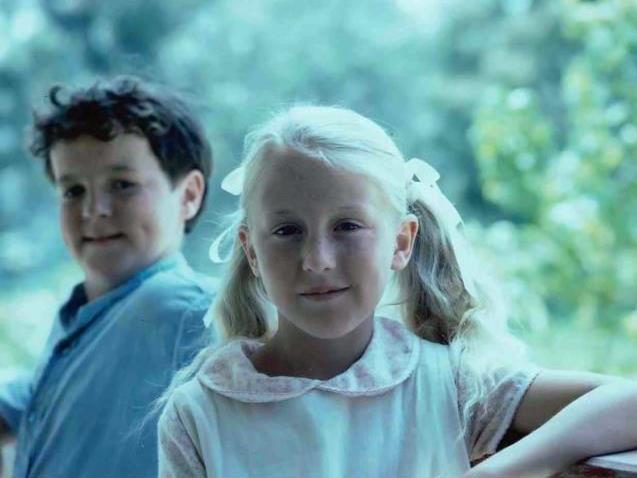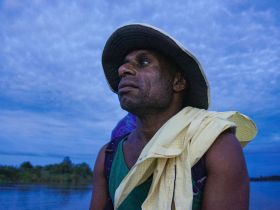Image: The True Story of Spit MacPhee, written by Moya Wood, directed by Marcus Cole, produced by Noel Price, with Rebecca Smart and Philip Hancock as the lead children.
Moya Wood, a film and television writer and script editor, and a true custodian of excellence, died last week in palliative care. She was 83 years old, and cancer took her quickly. Her death notice tells us she was a ‘loving sister to Jan, and the late Peter and Don. Devoted aunty and second mother to Matthew, Jessica, Amy, James, Alice, Michelle, Judy-Anne, Tim and Steven and loving sister in law to Robyn, Simone and Glenys. Doting great Aunt to Tom, Tilly and Bella.’
Our purpose here is to remember her through the eyes of her professional community, as her work helped to shape our national culture, starting with those rough but endearing episodes of Skippy.
Here she is, a bundle of quiet zest, at the age of 78, recorded by Susan Lever for NFSA..
At a celebration of her life on Tuesday, her friend and colleague Marcus Cole delivered a eulogy, written with some contributions from Michael Brindley. It was beautifully done, with a perceptive sense of her character, laced with insights into the life of a working writer.
—-
‘I first met Moya when I was a twenty-one year old wannabe scriptwriter. She and Lyn Bayonas had recently set up an agency in Paddington that they called The Source.
Moya thought I showed promise and offered to be my agent. Unfortunately there weren’t that many film and television writers back in 1974 and Moya and Lyn just couldn’t make a go of it. So I lost my first agent, but happily made a life-long friend in Moya.
Pretty soon I decided that writing was just too hard and I became a director. Moya forgave me for that and some years later I even had the privilege of directing a television mini-series that she wrote called The True Story of Spit MacPhee, (based on the book of the same name by James Aldridge). I mention Mr. Aldridge because I am sure she would want me to. Writers seldom receive the recognition or appreciation they are due and she was only too aware of that.
In the case of Spit MacPhee, it was the best job a director could have had. I was also working with her as her story and script editor. But editing Moya left me feeling I was not earning my money. There was so little for me to do.
I could have directed her first draft. What changes we did make were entirely cosmetic. It was clear that everything she wrote was going to work perfectly.
I also remember one time worrying that things were just going too smoothly, that working with Moya was too easy. Where was the pain – the arguments, the head-butting – that were necessary for creative success?
I needn’t have fretted. Moya knew what she was doing and, fortunately, I was smart enough to just let her do it. The show was a success and Moya won an Australian Writers’ Guild award.
But that was just some late icing on a very large cake. Moya was a pioneer in the film and television industry in this country.
In the late 1960s, she started her career in television as a script supervisor and writer on Australia’s first international hit TV show, Skippy, notching up eighty-seven episodes of the bush kangaroo.
This was followed by script editing and writing for Crawford Productions on the shows Homicide, Division 4, Matlock Police and Skyways.
In the 1970s and 80s, she was a busy script consultant and script editor working on movies that began the renaissance of the Australian film industry. They included Monkey Grip, Waiting, Dawn, Weekend of Shadows, Love Letters from Teralba Road and Summerfield.
She also did uncredited work on other notable films of that time, including Sunday Too Far Away and Newsfront. If she believed in you and your project she gave generously of her time and talent.
In 1986, she wrote a fine original screenplay that was produced by Jill Robb as the movie The More Things Change. Our mutual friend and colleague, Mike Brindley, worked with her as her script editor. Moya’s script was nominated for an AFI Award for Best Original Screenplay that year.
In the world of television, as senior script-editor, she was an essential element in the success of the long-running hit TV show A Country Practice.
Mike also worked with her on that show. He says that he ‘marvelled at the way she would edit some scripts. She’d cross out six lines of dialogue and replace them with one – in the margin in her big loopy handwriting, always with a fountain pen.’ I remember her love of quality fountain pens.
After A Country Practice, there were other adaptations and original scripts that were commissioned and written, but some did not make it into production.
Notable among them was a television mini-series about Australian war hero, Nancy Wake. Moya and Mike (this time her co-writer) even got to go to France with Nancy to do historical research, see actual locations and meet old resistance fighters. After a bumpy first meeting, she and the feisty Nancy Wake hit it off. Nancy appreciated Moya’s no bullshit attitude.
It was a grand and memorable adventure for the two writers. Mike drove the car and Moya sat in the back furiously scribbling notes as Nancy revealed stuff about herself and the resistance that aren’t in any book.
I remember reading the great scripts that they wrote. Unfortunately for them, there was some kind of power struggle at the Seven Network, producer Jill Robb was removed from the project, and Moya and Mike were called to a meeting and told there was ‘too much war’ in their scripts and that since the main character was a woman, the show should obviously be ‘a love story.’ New scripts would have to be written.
Moya didn’t agree or oblige. She resigned, as did Mike. New scripts were written, a very different kind of show was made and screened. Moya and Mike received no credit.
This was a major disappointment, but Moya went on working. She was a professional and there were still more stories to tell. And she went on helping others.
Mike says that ‘maybe it went against Moya that her dialogue wasn’t flashy, so people who can’t read scripts couldn’t see that what she wrote was beautifully economic, always “played” smoothly and maintained narrative drive and pace. She was also brilliant at hiding exposition.’ Anyone who worked with her stood to learn a lot from her. Both Mike and I certainly did.
In 1991 she was given the Australian Writers’ Guild Hector Crawford Award for ‘a significant contribution to the craft of scriptwriting via a body of script editing work. She accepted the award in her usual self-deprecating style, but was thrilled at the recognition and all the congratulations from her industry colleagues.
As to her character – what I think of as the essential Moya – for me it comes down to the following things:
Apart from being a person of talent and integrity, she was funny, fearless, and like Nancy Wake, certainly feisty.
She was largely self-educated. Everything she knew was hard-won. She learned about the world and her craft from the ground up. Yes, she was a dreamer, as all creative artists are, but she was necessarily a very practical one. Showbusiness is tough, not glamorous, and you need to be disciplined and self-reliant. She was.
I know some people found her daunting at times. She liked to talk and she was a plain talker. Not arrogant, just direct and to the sometimes acerbic point. She had strong opinions on most subjects and was quite happy to speak her mind. I remember copping a serve from her on one occasion…I deserved it, she was right.
She had no time for phonies or bullies, no time for dull-witted or mean-spirited people. She appreciated people who were truthful and decent, reliable and real – as she herself was. And if you could make her laugh you stood half a chance of getting closer to her.
She didn’t like people who bluffed or blustered. If she didn’t have an answer or didn’t understand something she came straight out and said so. How else could you learn? And she was always eager to learn something new from anyone of any age.
There was a child-like quality about her – an open-ness, a delight in making new discoveries. She wasn’t interested in clichés and platitudes and she never got old in her mind.
She was curious about all things, read widely, and thought about what she read. Politics, history, biography. You name it.
She loved jazz music, particularly hard-driving Bebop –John Coltrane, Dexter Gordon, Jackie McLean. Handel and Mozart were also on her playlist.
She also loved swimming and the beach. My wife and I used to go to Nielsen Park with her. Just sit there in the sunshine by the water, eating fish and chips and nattering on. Glorious.
She was not a sentimental person, not given to fuzzy, touchy-feely stuff. She didn’t wear her heart on her sleeve – she could be quite guarded at times – but if she liked you, trusted you, respected you, she was your friend for life.
I sometimes felt she undersold herself in a business full of self-promoters. She was not a schmoozer. She knew all the major players, but networking and partying with the right people did not interest her. It was always about The Work and letting it speak for itself and for her.
Ultimately, in her work, what she was interested in was closely observed characters – what made them tick. What happened next in a story came from their deep inner lives. And if she believed in YOUR characters, she would help you tell your stories.
Even approaching the end she was still wanting to hear stories about her friends and family. What people were doing, how they were thinking and feeling, and what the future held for them.
She was gallant at the end. She had made up her mind how she was going to deal with her final illness and she saw it through.
I know she wasn’t religious in the conventional sense, but she was a spiritual person. A few days before she died, she told me she believed in Nature, saw herself as part of an ongoing natural process that we are all subject to – whatever the mysteries – and told me wherever she was going she would carry those she loved in her heart.
– Marcus Cole
Here’s more of Moya Wood, talking about Skippy.





